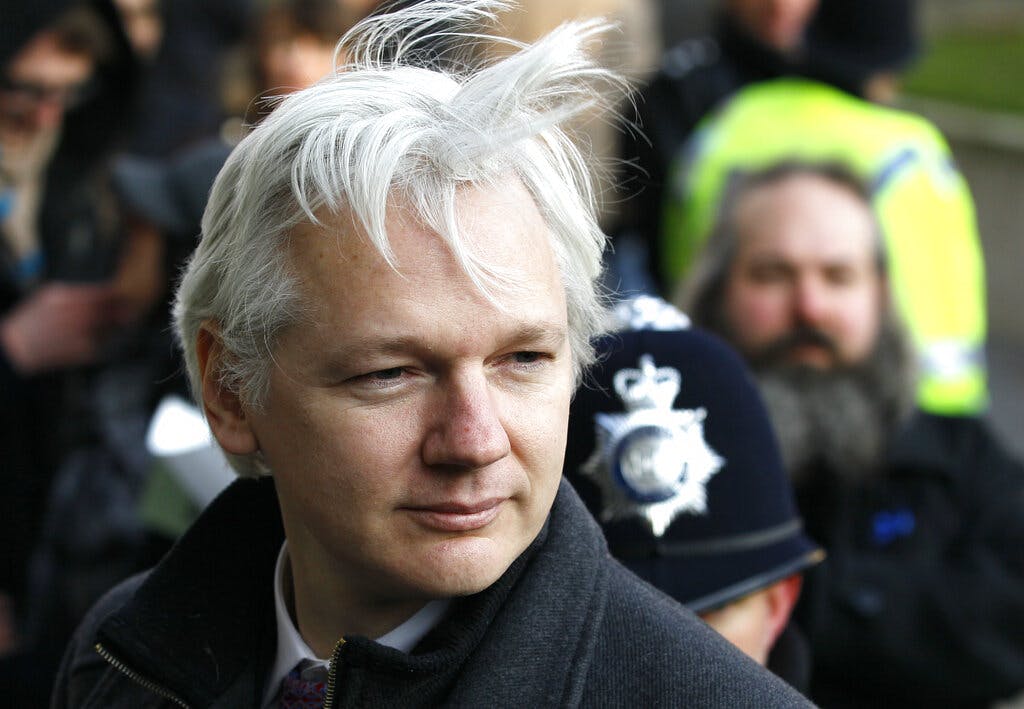Julian Assange Awaits Extradition Ruling That Could be Imminent
The Wikileaks founder faces 17 counts of espionage and one of hacking.

The U.K. could soon announce the fate of the accused spy Julian Assange, his website, WikiLeaks, claimed this week on its Twitter account.
The home secretary, Priti Patel, is expected to make the ruling on America’s request to extradite Mr. Assange. “The decision … is expected shortly,” the Twitter account for WikiLeaks claimed on Monday.
The U.K.’s cooperation with American efforts to extradite Mr. Assange has provoked outrage from some press freedom advocates and human rights organizations. It has also prompted criticism of the standards under America’s Espionage Act for protecting whistleblowers from prosecution.
Secretary of State Pompeo has also been called to testify in a Spanish court about alleged CIA plans to kidnap or assassinate Mr. Assange in 2017 while Mr. Pompeo served as director of central intelligence.
So far no definitive court has been prepared to adjudge Mr. Assange a whistleblower, though that could change. WikiLeaks has not elaborated on exactly when Ms. Patel’s decision is expected to be made public. It did tweet that it believes the judgment by Ms. Patel is “imminent.”
Mr. Assange faces extradition by the American government on 17 charges of espionage and one count of hacking related to the publication of classified documents provided by a former intelligence analyst in the United States Army, Private Manning.
Following the grand jury indictment on May 23, 2019, the Department of Justice called it “one of the largest compromises of classified information in the history of the United States.” If convicted, Mr. Assange could face a maximum of 175 years in prison. American officials say he is more likely to face four to six years in prison, the BBC reported.
On April 11, 2019, Mr. Assange was arrested by British police for jumping bail in 2012 to avoid trial in Sweden on sexual assault charges.
According to the Guardian, he was also arrested that day “on behalf of the US” on the charge that he, in coordination with Ms. Manning, helped to crack a password stored on Defense Department computers that was used to protect classified information.
The U.K.’s High Court ruled in December 2021 that Mr. Assange could be extradited to America, reversing the decision of the Central Criminal Court of England and Wales that cited a risk of suicide.
The high court’s reversal came after the Biden administration provided assurances that Mr. Assange would not be executed, held in solitary confinement, or confined in a supermax prison. In the eyes of the court, the assurances rendered concerns about Mr. Assange’s health moot.
These assurances, however, did come with the caveat that American authorities could revoke them were Mr. Assange to later do something that “meets the test” for harsher measures to be taken.
The possible extradition of Mr. Assange has provoked outcry from some journalists and press freedom activists. On Monday, Reporters Without Borders became the latest group to sign onto a letter urging Ms. Patel not to approve the extradition order and to release Mr. Assange from prison.
“We ask you, Home Secretary, to honour the UK government’s commitment to protecting and promoting media freedom and reject the US extradition request,” the letter, which has been signed by 19 press freedom organizations, reads. These include the Index on Censorship, International Federation of Journalists, and the European Center for Press and Media Freedom.
The letter also contends that Mr. Assange “would be unable to adequately defend himself in the US courts, as the Espionage Act lacks a public interest defence.” Passed in 1917 to prosecute spies and saboteurs who hampered the war effort during World War I, the Espionage Act outlawed the possession and publication of classified material.
The Act does not contain provisions protecting the collection of such documents by whistleblowers providing evidence of illegal government actions. Courts are not required to consider the motive of the accused in such cases at all, according to government filings in a 2019 case involving the prosecution of an NSA whistleblower.
In other words, a leaker does not gain immunity from prosecution even if the information in question is deemed to be in the public interest.
American standards for prosecuting such whistleblowers differ from many European democracies, which are bound by the European Convention on Human Rights. Article 8 of the Convention establishes the public interest principle, saying that whistleblowers’ interference with the right to privacy is sometimes necessary when their disclosures serve national security, public safety, or the economic well-being of the country.
Representative Tulsi Gabbard of Hawaii introduced a bill in 2020 to amend the Espionage Act to allow exceptions for the intent of the accused when they leak classified documents disclosing a “violation of any law, rule or regulation.”
Senator Wyden of Oregon and Representative Ro Khanna of California also introduced bills to amend the Espionage Act in 2020 to protect journalists who “solicit, obtain, and publish government secrets.” However, Mr. Wyden ensured in a statement that Mr. Assange could still be prosecuted were it to become law.
Neither bill received enough support to be brought out of committee, despite more than 1,900 journalists from 107 countries having signed onto a statement defending Mr. Assange’s actions.
“In a democracy, journalists can reveal war crimes and cases of torture and abuse without having to go to jail,” the statement reads. “If governments can use espionage laws against journalists and publishers, they are deprived of their most important and traditional defense — of acting in the public interest — which does not apply under the Espionage Act.”
Among the signatories is Daniel Ellsberg, known for leaking in the Pentagon Papers a secret history of the Battle of Vietnam compiled by the Defense Department and leaked to the press in 1971.
Critics of Mr. Assange say that his actions go far beyond the scope of journalism. A National Review columnist, David French, argued in 2019 that “no journalist is ethically required (or even permitted) to try to hack a password to allow his source [Private Manning] to continue his illegal work undetected.”
Mr. Pompeo, who was serving under President Trump at the time of Mr. Assange’s arrest, has called WikiLeaks a “non-state hostile intelligence service often abetted by state actors like Russia.”
According to ABC Spain, Mr. Pompeo is expected to appear before Spain’s High Court in June, along with a counterintelligence official, William Evanina.
They were called to testify about whether the CIA used a Spanish security firm, UC Global, in connection with an alleged assassination plot against Mr. Assange in 2017, which was reported last year by Yahoo News.
According to the report, senior officials inside the CIA and the Trump White House requested “sketches” or “options” for how to kill Mr. Assange. The plans were reportedly discussed after WikiLeaks published CIA hacking tools known as “Vault 7,” which the agency called “the largest data loss in CIA history.”
Mr. Pompeo has not yet confirmed whether he plans to appear in court later this month.

